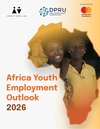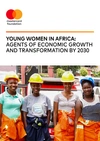A research collaboration between Caribou Digital and Genesis Analytics, conducted in partnership with the Mastercard Foundation.

The business process outsourcing (BPO) and information technology–enabled services (ITES) sector is a vital source of employment for Africa’s young workforce, supported by government initiatives to attract global outsourcing demand.
Countries including South Africa, Rwanda, Kenya, Nigeria, and Uganda have prioritized the sector, with ambitious plans to create millions of jobs. Currently, Africa’s sector workforce stands at just over 1 million, representing 2% of global supply. The sector’s job creation potential is considerable. Increasing Africa’s market share by 10 percentage points could generate 5 million direct and 7 million indirect jobs. Such growth is possible if Africa’s sector follows similar trajectories to India and the Philippines. However, current projections estimate a more modest additional 1.8 million direct jobs created by 2030.
Putting Africa’s BPO/ITES sector on a more accelerated growth path to realize its job creation potential requires investment in skills, connectivity, office space, and supplies. Arguably most importantly, it requires shifting perceptions about the quality of Africa’s outsourcing offer. Investments of this magnitude aren’t made quickly or easily, and artificial intelligence (AI) has thrown caution to many investors who are concerned about the technology’s impact on the sector.
The rise of AI, particularly generative AI, presents a dual-edged reality. While it offers opportunities for productivity and service expansion, it also threatens jobs and fundamentally alters the work landscape. This report, produced by Caribou Digital and Genesis Analytics in partnership with the Mastercard Foundation, examines the implications of AI adoption for Africa’s BPO/ITES sector, with a particular focus on the sector’s potential as a driver of youth employment.




